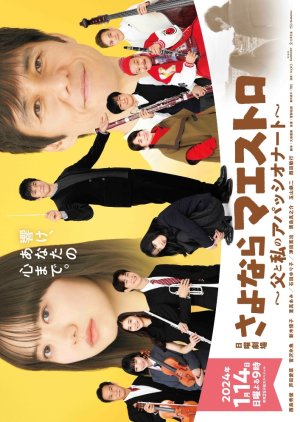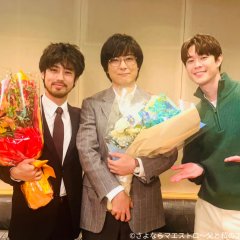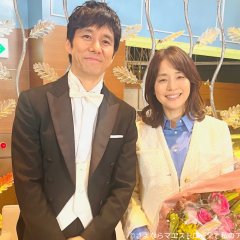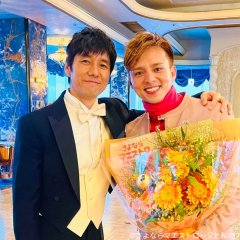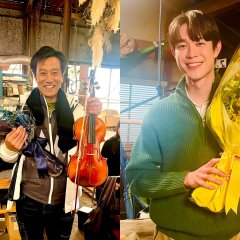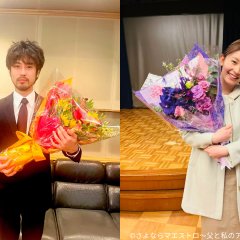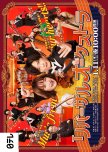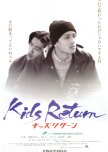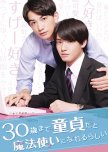Since he was in his 20's, Natsume Shunpei was a world famous maestro and lived abroad, while working with renown orchestras. He was always passionate about music and his passion inspired other musicians. But, Natsume Shunpei has zero abilities outside of music. He is unable to do simple things like housework. His life has been focused on himself and his music. Something happened that changed Natsume Shunpei's life. Due to that incident, his family, including his daughter Natsume Hibiki, left him and he left the music field. 5 years later, Natsume Shunpei returns to Japan for the first time in decades to conduct an orchestra in a province. He meets his daughter Hibiki that he hasn't seen in 5 years and they begin to live together. Unlike her father, Natsume Hibiki hates music and lives her life without it. Her father's genius ability in music clouds his view outside of music and he is unaware of his daughter's feelings. Natsume Shunpei faces Hibiki as her father and her life, that stopped 5 years ago, slowly begins to move again (Source: AsianWiki) Edit Translation
- English
- Türkçe
- Português (Brasil)
- Español
- Native Title: さよならマエストロ〜父と私のアパッシオナート〜
- Also Known As: Goodbye Maestro: Father and My Appassionato , Sayonara Maesutoro: Chichi to Watashi no Apasshionaato
- Screenwriter: Oshima Satomi
- Director: Ishii Yasuharu, Tsuboi Toshio
- Genres: Music, Comedy, Life, Family
Cast & Credits
- Nishijima HidetoshiNatsume ShunpeiMain Role
- Ashida ManaNatsume HibikiMain Role
- Tamayama TetsujiFuruya Satoshi [Bassoonist]Support Role
- Miyazawa HioMori Daiki / "Dai" [Trumpeter]Support Role
- Araki YukoKurashina Ruri [Flutist]Support Role
- Touma AmiTanizaki AmaneSupport Role
Reviews

Full of quirk and top of the pops in Classical music
I cannot be objective in my review of this series (and even less so than usual). I can give you eleven reasons why you, a perfectly normal Asian drama watcher, would peg this series as mid even among the usual froth of Japanese dramas. It's series full of quirky characters, fighting the good fight to preserve a community orchestra in a city that could not care less. It's a story of a family broken by an incident 5 years ago that struggles to come back together. It's an episodic series in which almost every episode is structured around a famous, overused piece of the Classical repertoire. It's a tepid romance. It has side plots that resolutely go absolutely nowhere. It has little to say about the realities of orchestral employment and production in the 21st Century. It fetishizes the old masters of the genre presented in a world in which anything composed after the 19th century in Europe does not seem to exist. It accedes a privilege to Classical performers which largely does not and should not be. It promotes stale tropes of following one's dreams and self-discovery. It's Art verses the mundanity of life, man!But ...
I loved it.
And not just for the Manachan of it all.
Of course we in the Cult of Ashida Mana were going to watch it. She has not won an acting award for a whole six months now and we have, naturally, grown anxious. Sadly she will probably not win one for this role even though she brings her usual prodigious strengths to the role of Hibiki, the estranged daughter of the protagonist Shunpei played by Nishijima Hidetoshi. Both of their performances were fine to excellent, and she had her usual moments of reactions to tear at one's heart. But Hibiki is no tragic heroine, and it's actually cool to have the Manachan playing a relatively normal young woman with a few daddy issues who gets to have a smidge of a romantic arc. Angsty, rebellious Manachan is my spirit animal.
Nishijima anchors the series well. His Shunpei is hopeless and clumsy at everything outside of music, but within that sphere his ethics and insights are pretty much spot on. He brings an old, tired community orchestra to life, and injects joy into what had become rote. He inspires people. He challenges people. He reconnects them to the reasons why they love making music. Yes, those are also tired tropes of the genre, but they also result in fun little payoffs throughout the series.
Surrounding the two are over a dozen quirky characters in the two's family and the orchestra. All the actors are promising up-and-comers or polished veterans, and kudos to the production for placing Nishida Toshiyuki in a tasty role as the owner of the local music café despite the fact that the actor clearly has mobility issues even if his character doesn't. I'd give special shout-outs to Miyazawa Hio and Touma Ami for seemingly having genuine musical talents in addition to fulfilling their roles well. Miyazawa sings a jazz standard in English at one point and his American accent is so good that you'll have to click over to his MDL page to learn that he was born in San Francisco. And Touma does really seem to play the violin even if it's just Twinkle Twinkle Little Star: (I'm not crying: you are!).
The writing in this series resolutely avoids having a plot, or, at least, resolutely avoids resolving the mild stakes it sets up in the ways we expect these things to be resolved. And that's a good thing! Will the orchestra be thrown out of its practice space by the evil mayor? Will the evil mayor learn to accept is daughter's love of music? Will the orchestra win the festival that they struggled to get into to convince sponsors to help keep the orchestra going? Will Hibiki and Daiki fall in love? The answers may surprise you, and honestly I found most of payoffs refreshing.
And so if you enjoy Classical music or even dramas about quirky communities coming together to struggle against the usual entropy of living, then you'll likely find the show to be worth your time. As for me, it pretty much hit all the right notes.
Realistic
This is one of the best dramas of the season. At the beginning I had big doubts, because all the shows with a theme reated to an orchestra are writte so naively that anybody in conctact with a real orchestra and real music cannot bear watching it.But this is so much different! The constrast e.g to 'Reversal Orchesra' cannot be larger, even if they start with a similar dilemma. "Goodby Maestro" is greately written and directed: they avoid almost all situations where they cannot make it near to realistic. The actors are also doing a great job, not only the well known names, but also the young actors!
The music is carefully chosen: the classical one and the modern inlets are great and perfectly suited to the moments they have to appear. It is impressive that some of the big actors wentso far that they learned a few German phrases - it is not obvious at all for the big shots. On the other hand, the "German" and "Italian" actors were really bad...
This show is 100% worth watching it and even more if you like classical music and orchestras.

